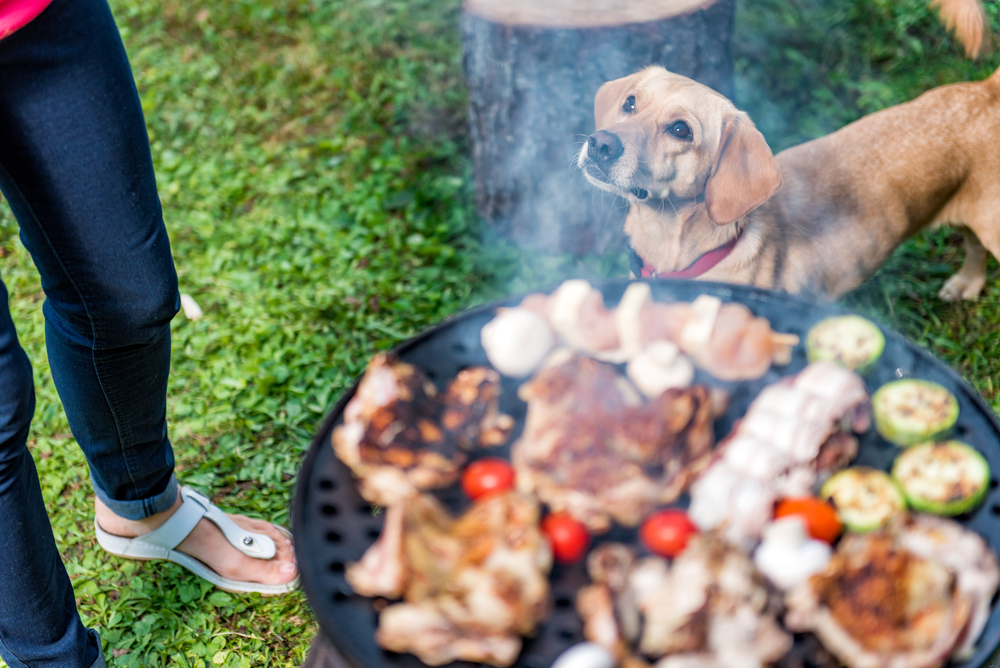Welcome back to our Summer Hazards blog series, where we provide a breakdown on common summer hazards for pets that you can share with your clients. Running out of time during this busy season to create your own content? Let us help! All you have to do is share this blog post to your channels, and you can help inform your clients on the common dangers that may be lurking in the summer sun.
Backyard barbecues, summer parties, and dog park outings are favorite activities during the warmer months. But what’s fun for us can sometimes be risky for our pets. Here’s what to keep in mind to help your pets stay safe while you enjoy the season.

Fireworks & Loud Noises
How to help manage noise phobia and firework anxiety in pets.
Many pets experience noise anxiety from fireworks, loud music, or general party chaos — even summer thunderstorms. If your pet hides, trembles, vocalizes, or acts destructively, they may be showing signs of stress.
Tips to help:
- Monitor your pet’s behavior during loud events.
- Create a quiet, secure space indoors.
- Ask your veterinarian about calming tools like pheromones, supplements, or medications.
Toxic Foods & Table Scraps
Know the risks that food scraps pose to your pets.
Barbecues are a summer staple, but they come with hidden food dangers for pets. Some human foods are highly toxic to animals, including:
- Common toxins: onions, grapes, chocolate, alcohol
- Obstruction hazards: corn cobs, cooked bones
Even small amounts of these items can cause serious illness or require emergency surgery. Risks of pancreatitis and foreign body obstructions (both cats and dogs can suffer from this) can increase depending upon the type of food pets may get a hold of — with both conditions being dangerous and classified as an emergency. To help reduce these risks, keep pets away from unattended plates and ask guests not to share food.
Unsure what your pets are able to safely eat? Check out this helpful resource from Pet Poison Helpline. (As a general rule, we recommend erring on the side of caution and not sharing human food with your pets)>

Grease & Grill Scraps
You might want to think twice before sharing your plate with your pets.
That grilled meat might smell irresistible to your pet. However, greasy leftovers and fatty scraps can trigger digestive upset, and in some cases, can cause pancreatitis — a painful and potentially serious condition. As mentioned above, foreign body obstructions can also be caused by bones from grilled meat or corn cobs, so be sure to avoid letting your pet have access to any barbecue or grill scraps.
Avoid letting pets lick plates or nibble on trimmings. Even a little grease can be enough to cause trouble.
If you’re concerned your pet may be suffering from pancreatitis, be on the lookout for these signs:
- Nausea
- Vomiting
- Diarrhea
- Lethargy
- Decreased appetite
- Abdominal pain
- Fever
If your pet shows any of these signs, contact your veterinarian immediately for the next steps.

Party Chaos & Escape Risks
Make sure your pets are secure before your guests arrive.
Summer gatherings mean extra foot traffic, which can mean open gates, doors, or distractions that can lead to pets slipping out unnoticed. Even friendly, well-behaved pets might bolt if overwhelmed or curious, or they see someone they know outside.
Help prevent escapes by:
- Keeping pets inside or in a secure area.
- Letting guests know not to open certain doors.
- Using baby gates or crates when needed.
Decor Dangers
Know what party decorations may be hazardous for your pets.
Decorations can add flair to your celebration, but many pose risks if chewed or swallowed. Be especially cautious with:
- Glow sticks
- Sparklers and fireworks
- Wooden skewers
- Ribbon, string, and table décor
If your pet ingests something unusual, don’t wait! Call your vet, local emergency clinic, or the Pet Poison Helpline at 855-764-7661.
You can also contact the ASPCA Animal Poison Control Center at 888-426-4435.

Dog Parks: Fun or Frenzy?
Let’s talk about dog park dangers and some safety tips.
Dog parks can be a great place for your pup to burn energy and socialize. But did you know they’re not always the safest setting? With dogs of different sizes, temperaments, and training levels sharing one space, bite wounds and other injuries are unfortunate but common occurrences
Before visiting a dog park:
- Make sure your dog is comfortable in group settings.
- Supervise closely and intervene early if play gets too intense.
- Avoid peak busy hours if your dog gets overwhelmed.
The AKC’s dog park etiquette guide is a great resource to review before heading to the park. This can help increase the likelihood of a positive outing, for both you and your pup.
Stay Safe & Enjoy the Season
With a little extra planning, summer celebrations can be safe and fun for everyone — pets included! Keep this guide handy, and don’t hesitate to reach out to your veterinary team with any questions or concerns.
Need help determining whether a situation is an emergency? Keep our vet-informed guide on hand for quick reference in urgent situations.

